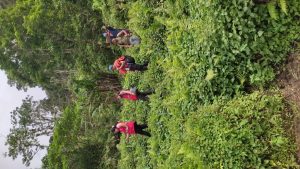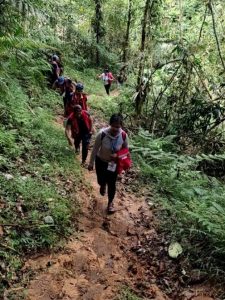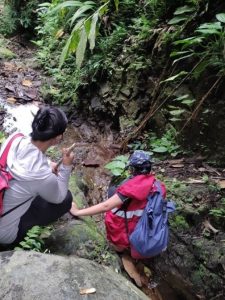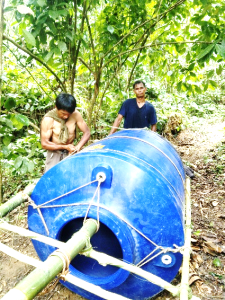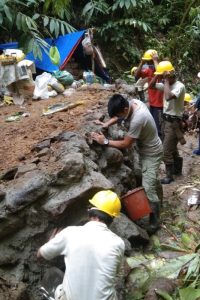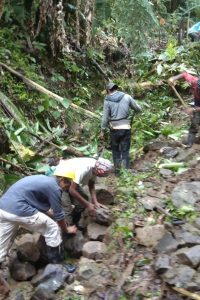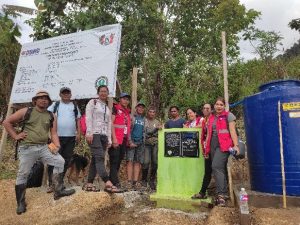
At last, a new water system finally reached the community of Mamaga to cater their needs. Mamaga is one of the seven sitios of barangay Poswoy in the landlocked town of Balbalan in Kalinga province and considered as the second farthest sitio in the town only accessible through three hours trail hike.
Mamaga, which is composed of 24 household rely on agriculture as their main source of livelihood. They also lack basic resources such as communication signal, electricity, and safe water supply.
Since 2003, the residents have requested for the construction of a new water system but, unfortunately, was denied multiple times because of the high cost of hauling.
It was on August of 2021 when KALAHI-CIDSS also known as Kapit Bisig Laban sa Kahirapan – Comprehensive Integrated Delivery of Social Services program was introduced to the municipality. Its 14 barangays underwent the procedure of Disaster Response Operation Modality (DROM) due to the COVID-19 pandemic that affected the country.
In the same year, the community of Mamaga also almost lost hope when their request to have a new water system was not favored during the Phase 1 implementation of KALAHI-CIDSS.
With the community members’ perseverance, in 2023, they re-echoed their wish to be granted as the old water system has already been damaged due to rusty pipe works and typhoon.
Hearing the news that the construction of a new water system for Mamaga was prioritized for the Phase 2 of KALAHI-CIDSS, the community elated with joy considering this is the first government project that reached their far-flung sitio.
“Uray kasatno kaadayo na daytoy lugar mi, agyaman kami ta inmay ti KALAHI-CIDSS ta nu awan siguro iti KALAHI-CIDSS nga tatao ti agpili project baka han pay nalpas daytoy nga padanum. (No matter how far our municipality is, we are thankful that KALAHI-CIDSS came because if there is no KALAHI-CIDSS, where the people get to choose the project, this water system might not have been completed),” says Community Volunteer Elpidio Banggoc.
Beyond the implementation of the infrastructure project, KALAHI-CIDSS utilizes the Community Driven Development (CDD) approach which ensures that development priorities are addressed in the participatory, collective, and inclusive method. And for the construction of the water system, CDD is evident through the community’s active participation during the Barangay Disaster Risk Reduction and Management Council (BDRRMC) meeting and all conducted trainings.
With the strong interest and willingness of the community members of Mamaga for the project to be implemented, they endured hiking, spending the night at Poblacion, and an hour of travel to reach the municipal hall of the town and participate in the trainings which is part of the Community Empowerment Activity Cycle, one of the platform used by the program in engaging communities.
Challenges
The beginning of the implementation of the project is not also a walk in park.
After the site validation, it was found out that the funds for the construction of the water system remain insufficient and Municipal Social Welfare and Development Office Myrna Cannapi was able to convince the Local Government to allocate the funds needed as part of their local counterpart contribution for the project to push through.
“Ta han da panawan jay lugar tulungan tayo ah isuda nga pumintas ti kasasaad da (Let us help them improve their situation so that they don’t leave their place),” says Cannapi during the Municipal Inter-Agency Committee technical session.
Meanwhile, Barangay Kagawad Romeo Gaayon who helped in monitoring the construction process narrated the challenges faced during the project implementation.
Gaayon said that there were hindrances such as the weather and time-consuming hauling, however these were overcome by the community’s strong will to deliver a high-quality and timely sub-project.
“Marigatan da ti hauling gapo ti kinaadayo na ken agsarusaruno ah bagyo ngem adu ti umay makitrabaho tapnu mayat ken mabiit malpas project (They had difficulty in hauling [the materials] because of the distance and subsequent typhoon but many came to work in order to finish the project),” he stated.
Nonetheless, the joint and collaborative effort of the community, LGU, Barangay Development Council-Technical Working Group, and the agency led to the completion of the ‘Mamaga Water System in Poswoy’ with a total project cost amounting to Php 757, 552.55.
Sustainability
After the completion of the project, a Sustainability Evaluation Test (SET) was led by the program through the Area Coordinating Team on 08 August 2024, together with the members of Barangay LGU and Operations and Maintenance Group in order to assess its status and actual utilization.
It was found that the project remains operational benefitting the primary school and households in the community. The barangay also relayed plans of creating more direct line in order to supply more beneficiaries. They further assured the cleanliness of the sub-project, and the presence of identified group members to check its status when hazards occur.
The completion of the project is like an answered prayer to the community but it was also the community’s grit, active participation and KALAHI-CIDSS paving the way for a water system to be built in one of the distant communities in this town.
#DSWD FIELD OFFICE CAR ACT-BALBALAN with SOCIAL MARKETING UNIT- Lauren A. Alimondo, KALAHI-CIDSS Social Marketing Officer.





